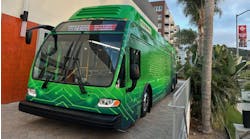Volvo Shows Electric Bus at UITP in Milan
Volvo’s new electric bus is one of the centrepieces at the large UITP show that brings together public transport representatives from all over the world in Milan on June 8-10. The quiet, exhaust-free and passenger-friendly electric bus is the latest result of the Swedish manufacturer’s intense focus on electromobility, which also includes hybrid buses and electric hybrids.
“The fully electric bus completes our electromobility range. Together, the hybrid, electric hybrid and electric buses enable customers to cover all different aspects of sustainable city mobility,” said Håkan Agnevall, president Volvo Buses, adding: “This rapid development is based on our determination to help solving one of the greatest challenges faced by mankind: environmental sustainability. We believe that one of the most basic needs in society, moving around freely in our cities, should be clean and silent, feeling like a journey towards a sustainable future.”
A full product portfolio is one of three cornerstones in Volvo Buses’ electromobility strategy. It also includes offering complete systems, which include buses as well as the infrastructure. The third cornerstone in Volvo Buses’ strategy is to work towards open charging interfaces that enable customers to use buses from other manufacturers as well.
Turnkey Approach With Strong Partners
The turnkey approach basically means that the customer drives the buses, while Volvo Buses takes care of the rest. Together with the global partners Siemens and ABB, the company is able to offer complete solutions for the electric infrastructure, including the smart conductive charging. Volvo Buses can also team up with local partners for providing workshop, depot and traffic management.
Commercial Launch in 2017
Volvo Buses range of electrified buses includes the previously launched Volvo 7900 Hybrid, which has been a major commercial success with more than 2000 units sold, and the Volvo 7900 Electric Hybrid, which was launched in autumn 2014.
Unlike these two, the first electric bus is a concept vehicle. 10.7 metres long (more than a metre shorter than a conventional bus) it can carry up to 86 passengers. The centrally positioned driver’s seat contributes to the high passenger capacity.
Energy consumption of the electric bus is about 80 percent lower than that of corresponding diesel buses. Series production of all-electric Volvo buses is scheduled for 2017.
The Electric Bus is Part of ElectriCity
Presently, the new electric bus is now being tested in regular traffic in Gothenburg, Sweden ahead of its official premiere on June 15. The electric bus is part of the ElectriCity cooperative venture that develops, demonstrates and evaluates innovative solutions for future sustainable public transport.
Three all-electric buses and seven electric hybrids, all from Volvo Buses, will serve a new bus route (55) between the campuses of Lindholmen and Chalmers and run through the center of Gothenburg. All vehicles are equipped with battery packs that can be quick-charged with renewable electricity at the end terminals.




